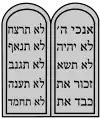Maisit
The Torah distinguishes two types of enticers to idolatry: mesit (Hebrew: מסית) (Deut. 13:7) is a Jew who seduces an individual to idolatry, while a madiach (מדיח) (Deut. 13:14) is someone who publicly entices many into idolatry. An enticer to idolatry may be both.[1][2] Enticement to idolatry in Judaism is a capital offence under the Law of Moses.
| Part of a series on |
| Judaism |
|---|
   |
|
Biblical Source
Deut. 13:7-9 states:
13:7 If thy brother, the son of thy mother, or thy son, or thy daughter, or the wife of thy bosom, or thy friend, that is as thine own soul, entice thee [yeSITikha — the root of the word meSIT] secretly, saying: 'Let us go and serve other gods,' which thou hast not known, thou, nor thy fathers;
- י יסיתך אחיך בן אמך או בנך או בתך או אשת חיקך או רעך אשר כנפשך בסתר לאמר נלכה ונעבדה אלהים אחרים אשר לא ידעת אתה ואבתיך
13:8 of the gods of the peoples that are round about you, nigh unto thee, or far off from thee, from the one end of the earth even unto the other end of the earth;
- מאלהי העמים אשר סביבתיכם הקרבים אליך או הרחקים ממך מקצה הארץ ועד קצה הארץ
13:9 thou shalt not consent unto him, nor hearken unto him; neither shall thine eye pity him, neither shalt thou spare, neither shalt thou conceal him;
- לא תאבה לו ולא תשמע אליו ולא תחוס עינך עליו ולא תחמל ולא תכסה עליו
The Law of Moses takes a strong and non-compassionate approach to the enticer due to the offensive service of idolatry to which the enticer seeks to draw worshipers.
Rabbinic interpretation
The crime of the enticer to idolatry was so serious and dangerous that in some cases some legal (halakhic) requirements of due process could be relaxed in order to entrap the enticer.[3] The halakhot regarding a mesit and madiach may be found in Maimonides' Mishneh Torah: Sefer haMada: Avodat Kokhavim (Idolatry): Chapter Five.[4] Five negative commandments regarding the mesit are derived from just one verse, Deut. 13:9 (quoted above); they are: [5] [6]
- Not to love a mesit
- Not to reduce one's hatred for him
- Not to save his life
- Not to advance any arguments on his behalf
- Not to withhold information that will lead to his conviction
A person is a mesit if for example he tells a colleague, "I will worship a false deity. (Follow me;) I will go and worship..." or "Let us go and worship..." That is, whether he entices his fellow in singular or plural terms. When he proselytizes two individuals, they may serve as witnesses against him. They should summon him to court and testify against him, relating what he told them, and the mesit is stoned.[4]
Considering the extreme stance Deuteronomy 13 takes regarding to enticement to idolatry, Chazal list numerous detail that project the unique methods required to deal with the enticer;
- Even if the enticee did not worship idolatry in action the enticer is still liable to death
- The enticer is liable to death even without the normal process of warning (Hebrew hathra'ah)
- It is legal for the witnesses to conceal themselves when visualizing the enticer in action
- It is legal to withhold witness material that could potentially save the enticer
- The enticed person himself is obliged to bring the enticer to the stoning area
- Public announcement of an impending execution of the enticer is required
Although the original context of Deuteronomy is paganism, in some later rabbinic interpretation the passage about the "enticer" was also applied to Christian proselytism.[7][8]
See also
References
- Peter Schafer Jesus in the Talmud - Page 68 2009 "The mesit is someone who seduces an individual to idolatry,27 whereas the madiach is understood as someone who publicly entices many into idolatry.28 Jesus, the Talmud tells us, was both: he not only enticed some individual but all of"
- Jastrow fr.—Esp. מסית or מסית (with ref. to Deut. XIII, 7, sq.) he who stirs people up to worship idols. Snh. V I I, 10. Y.ib. 1. c. מי. ..בלטון גבוה וכי the massith speaks in a loud voice, the maddiah ( (נדח'.ד in a low voice;
- Marianne Sawicki -Crossing Galilee: Architectures of Contact in the Occupied Land of Jesus2000 - Page 167 "But the crime of the enticer (Hebrew mesit) was so serious and dangerous that some of the legal requirements of due process could be relaxed in order to enable the authorities to entrap the offender. The mesit was like salt in the soil."
- https://www.chabad.org/library/article_cdo/aid/912363/jewish/Avodat-Kochavim-Chapter-Five.htm
- https://www.chabad.org/library/article_cdo/aid/912359/jewish/Avodat-Kochavim-Chapter-One.htm
- Moses Maimonides, The book of knowledge: from the Mishneh Torah of Maimonides Helen M. Russell 1981 -Page 70 "Treatise 4 IDOLATRY Fifty-one commandments, two positive and forty-nine negative, are enumerated here. They are: 1. ... 14. Not to love an enticer. 15. Not to stop hating an idolater. 16. Not to save him. 17. Not to plead for him."
- David Berger (professor) in Jewish history and Jewish memory: essays in honor of Yosef Hayim Yerushalmi, ed. Elisheva Carlebach, John M. Efron - 1998 -Page 26 "Medieval Jewry was heir to two sets of internal sources about Jesus: a handful of scattered remarks in rabbinic texts and the various versions of the counter- Gospel known as Toledot Yeshu.1 There is little we can say about the image of the enticer and bastard sorcerer who was hanged from a stalk of cabbage.2"
- Joshua Schwartz, Marcel Poorthuis Saints and role models in Judaism and Christianity 2004 Page 292 "... the Ben Stada narratives in Rabbinic literature and the traditions concerning the mesit or enticer can be applied to the apostle Peter, cf."